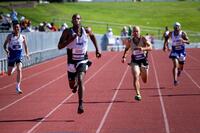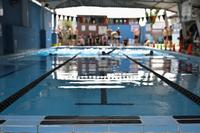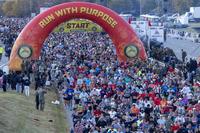We exercise for a wide variety of reasons. Many work hard to look and feel good, while athletes train to focus on reaching their performance goals. All of us, from moderate exercisers to advanced-level athletes, should listen to our bodies and incorporate rest days into our routine in order to see the best results in both performance and longevity.
Reduction of stress is basically what we are doing when we actively pursue recovery in our personal and professional lives. Taking a day off from anything that adds stress (exercise included) can help us all avoid burnout and maintain a healthy balance between training, optimal performance, longevity and rest.
Check out the REST acronym for a useful reminder of why we should take R.E.S.T. days:
R: Recovery
We take a rest day to recover and grow stronger. If we skip proper rest and don't utilize the recovery tools of life, burnout will soon follow. An important part of any athlete's routine always includes recovery activities prior to competition. For non-athletes competing with life's situations, our approach cannot be any different.
Basic recovery involves stretching, massaging, foam rolling and other methods that help the body relax and heal after intense physical activity. Taking a rest day when needed and actively pursuing recovery strategies can help us all stay in peak condition and even prevent illness and injuries that will cause us to have to take several rest days.
E: Eat Well
Avoid diets that eliminate macronutrients. Our bodies need protein, carbohydrates and fats. Think of the foods we eat as the fuel that drives our engines throughout the day of work, school, exercise and family life. Foods rich in protein, good fats (amino acids, omega-3 fatty acids) and carbohydrates (fruits, vegetables, antioxidants, multigrains) are needed to balance out the stress hormones in our bodies.
Regardless of how the stress hormones are increased, whether it is from bullets flying over your head, being unable to pay a bill at the end of the month, or working out hard 7 days a week, stress is stress, hormonally speaking. What we eat helps us to deal with great amounts of stress.
S: Sleep
While eating healthy foods is important, sleeping is even more important. Sleep is our No. 1 recovery tool. Between eating and sleeping, we can recover at least 90% from the daily stresses we endure throughout all areas of our lives.
When we go to sleep, we are not just asking the mind and body to recover from physical activities, but also all of the stresses life makes us endure every day. Our great daily reset is a good night's sleep. In fact, if you miss out on just a few nights of good restorative sleep, you are basically going to have similar symptoms of overtraining that an advanced-level athlete may have in a peak training cycle, even if you are not training.
Sleep is essential if athletes want to perform their best, and the same is true for non-athletes. Adequate rest helps the body repair and recharge and can prevent the injuries caused by fatigue and exertion. Work hard to get 7 to 8 hours of sleep each night to ensure you are well-rested and ready to perform.
T: Time Off
We all need time away from life's stressors. Whether you take a day off from work, school or physical training through normal scheduling (such as the weekend) or you really need a day off in the middle of the week due to your health, consider days off a battery recharge instead of thinking of that time as lazy and unproductive.
How you frame your "easy days" will help you avoid guilt, as long as you are legitimately taking time off to better your future performance and health. A weight lifter will take days off between the same type of lifts in order to recover from previous heavy-lift days. That's necessary if the lifter wants to see strength increase. Time off equals strength gained and resiliency in life's daily challenges.
For the professional athlete, taking breaks from training and competition is important to maintain personal health, optimal performance and longevity in the sport they use to earn a living. Taking a break can also give athletes a mental and emotional reset, helping them to keep a positive mindset and stay on track.
Another way to look at taking a REST Day is to compare it to hydration strategies. You don't start drinking once you are dehydrated, you sip on water and electrolytes throughout the day before you even feel thirsty. Having rest days planned during the week is going to help you avoid burnout, just as sipping on water throughout the day will help avoid dehydration and heatstroke.
-- Stew Smith is a former Navy SEAL and fitness author certified as a strength and conditioning specialist (CSCS) with the National Strength and Conditioning Association. Visit his Fitness eBook store if you're looking to start a workout program to create a healthy lifestyle. Send your fitness questions to stew@stewsmith.com.
Want to Learn More About Military Life?
Whether you're thinking of joining the military, looking for fitness and basic training tips, or keeping up with military life and benefits, Military.com has you covered. Subscribe to Military.com to have military news, updates and resources delivered directly to your inbox.


















